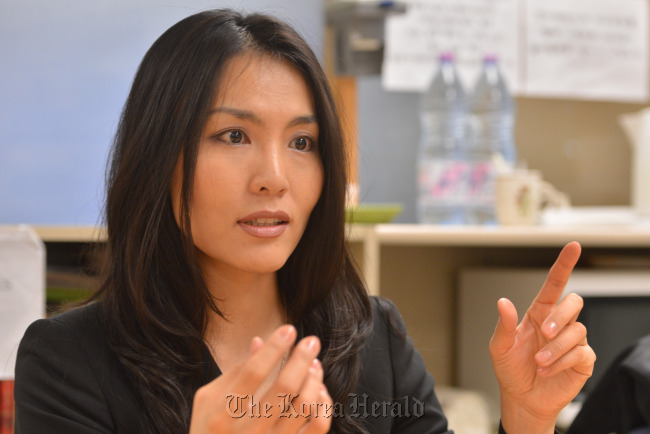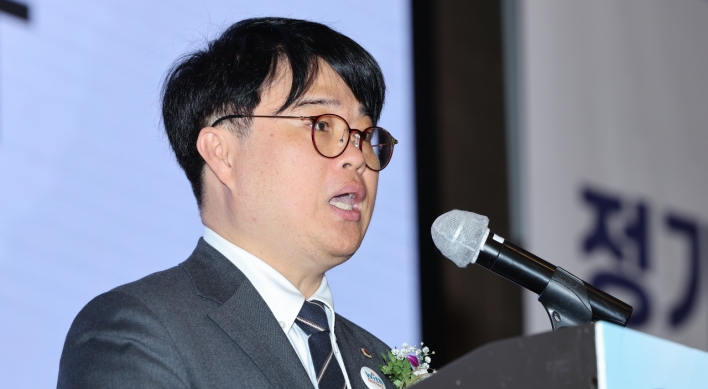World peace, to many, is just an ideal, but Jung Eun-hee, founder and executive director of a New York-based International Virtual Schooling, believes that the world can be a better place in the future if promoting intercultural exchanges among young people around the world through internet and technological devices.
Jung, 40, has designed and is currently operating an e-learning program called International Virtual Elementary/Secondary Classroom Activities, or IVECA for short, which enables students in different countries to communicate and study together through virtual classroom setting. From the United States and Korea to Panama City and Bhutan, hundreds of students have shared and developed their ideas on common issues through online discussion, audio messages and video conferencing.
“The program is designed to promote mutual understanding among children around the world, to help them develop intercultural competence and become truly global citizens who would make a better world,” Jung said, adding that she also dreams of having North Korean students in her program.
Jung, 40, has designed and is currently operating an e-learning program called International Virtual Elementary/Secondary Classroom Activities, or IVECA for short, which enables students in different countries to communicate and study together through virtual classroom setting. From the United States and Korea to Panama City and Bhutan, hundreds of students have shared and developed their ideas on common issues through online discussion, audio messages and video conferencing.
“The program is designed to promote mutual understanding among children around the world, to help them develop intercultural competence and become truly global citizens who would make a better world,” Jung said, adding that she also dreams of having North Korean students in her program.

The participants use English as the official language.
“This method offers a chance for non-English speakers to improve their foreign language skills but also motivates native speakers as well to enhance their communicative skills and accuracy in writing and speaking,” she said in an interview with The Korea Herald. She is currently in Seoul to open a liaison office here to better coordinate programs for schools in Asian countries and help the center raise funds from Korean companies operating overseas businesses.
The former elementary school teacher in Korea said she was always interested in designing programs to show students a bigger world and to let them understand the differences in culture. While spotting a Korean man in the subway learning English through his mobile, she hit on a new idea ― connecting kids at schools around the world through information and communication technology. In 2004, Jung left for the U.S. to research and develop her idea. Two years later, based on her studies and research at the University of Virginia’s Curry School of Education, she began operating intercultural classroom exchange programs between five schools in Korea and the United States.
In 2009, she founded the Center for International Virtual School, a nonprofit organization to support the IVECA program, to expand her vision.
The center forms partnerships between schools around the world and develops an integrated and customized educational program that suits the existing curricula from both sides. It also trains teachers to understand the goal of the program and seek intercultural collaboration with other teachers around the world. In recognition of her efforts, Jung won the 21st Century Award for Excellence in Distance Learning from the U.S. Distance Learning Association in 2009. It was also introduced to the United Nations and UNESCO as a role model of promoting friendship between young people around the world through the use of ICT.
The demand for the program is growing with schools in Africa and the Middle East expressing their interest through various channels. But money is the problem, Jung says.
“It is hard to get sponsorship to help schools in developing countries have better access to advanced education programs. I want to expand the size of the project. But without a stable financial source, it is almost impossible,” she said.
Asked of her opinion on Korea’s enthusiasm for education, particularly for English, she said she feels pity for children who spend the whole day at school and later at hagwon, not knowing why they have to. However, the IVECA program has somehow helped many participating students understand that learning is not a competition with others, but can be a useful tool to better communicate with them.
“They are thrown into the fierce competition and never get to understand the purpose of learning. But I was surprised to see some students motivated to learn English and other subjects more to improve their intercultural skills,” she said.
By Cho Chung-un (christory@heraldcorp.com)
-
Articles by Korea Herald



















